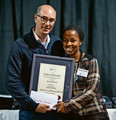
When Ngitholiseni Sithole arrived at university last year, he barely spoke any English. He even dropped a subject because he couldn’t understand his lecturer.
Now Sithole (19) is in his second year of a Bachelor of Science degree at Wits University and he’s confident enough to ask questions in class.
Sithole, from Msinga in KwaZulu-Natal, is a Moshal scholar – a programme that allows him to study without worrying about how he’ll pay for his fees or boarding.
It’s an unusual scholarship because instead of just focusing on academically brilliant pupils, it imagines how well average students might do if they focus on their books rather than stressing about money.
Kate Kuper, the CEO of the Moshal Scholarship Programme, says once a student’s financial burden has been lifted, they are often able to excel.
The scholarship covers all tertiary and boarding fees and, crucially for youngsters coming to the often alien world of a university campus, psychosocial counselling.
The scholarship was started in 2009 by British businessman Martin Moshal.
“What he wanted was for the children to get good degrees in areas that would get them good jobs. His return on investment is that they get good salaries and when that happens, they can help a lot of other people including their families, communities and, one day, the world,” says Kuper.
Students are identified in their first year at university, but the Moshal Foundation hopes to start identifying them sooner. When they’ve finished university, they are given career guidance.
Jodi Bailey, Moshal’s programme coordinator, offers counselling and support to the students.
“If the students have an issue, personal or otherwise, I deal with it. Moshal has the network and the money to access doctors, lawyers and whatever support the students need.”
Sithole is one of eight children whose bead-making mother supported them by selling her wares. He attended Dlenyane Combined School barefoot and couldn’t go on school trips because there was no money.
It’s clear that Sithole misses his mother. “She calls often because she doesn’t understand the big city. She has never been here. But she is very proud of me.”
Inspiring stories abound about the Moshal programme – and its scholars have good advice for those who want to follow in their footsteps.
Qaqama Maxamba was a top performer at Khwezi Lomso Comprehensive School in Port Elizabeth and sometimes helped to teach her classmates.
“One day in high school, my teacher asked if I could help with explaining something to the class. I was only able to say a few words and I couldn’t go on. I asked to be excused. When my teacher asked what was wrong, I told him I was hungry. I had not eaten that whole day because I had nothing to eat.”
Today, Maxamba (22) is one of Rhodes University’s top maths students, bagging three distinctions in her third year. She’s completing an Honours in maths and mathematical statistics.
It’s a far cry from sharing a single bed with her unemployed mother, and she admits she struggled to adjust.
Her mother could only afford to buy her second-hand clothes and this made her feel inferior to other students.
“When you get to Rhodes, you can see [by] how people speak that they are better. But I always think about what I learnt back home. I am not what I wear or what I look like because even if I cry every night, I cannot change my circumstances – my mother could not afford what others have.”
She still tutors at township high schools and helps children at a local orphanage with their homework.
“I am my mother’s only hope and regardless of where I come from, I can change it.” Once she’s finished studying, Maxamba hopes to join the ranks of Moshal scholars who’ve taken the all-important next step into the working world, like Ntsako Chauke (23).
Chauke is an internal audit trainee at PwC and was one of the first Moshal scholars. She grew up in Joburg and was in her last year at school when her father, the family’s breadwinner, died.
“His death was really unexpected and it was a difficult time. But my mother was really supportive and even my grandmother came to live with us to support us.
“My mother was able to raise the money for me to register at the University of Johannesburg, but I didn’t even know how I was going to be able to pay for the rest.”
But a few weeks after registering, she received her statement from the university and discovered that her fees had been fully paid. That was how she learnt she was a Moshal scholar.
Now she works for one of the biggest auditing firms in the country and has some advice for young South Africans trying to crack the job market.
“The scariest thing about the corporate world is that you don’t have the same support structure as you did back in varsity.
“The people who have been in the industry longer and know how things work are quite intimidating. But I try to take every opportunity to ensure I participate in the company and try to build that circle.”
By: Athandiwe Saba
Picture Caption: Martin Moshal, who founded the scholarship, with maths boffin Qaqama Maxamba. Picture by: Franco Esposito
Article Source: City_Press

